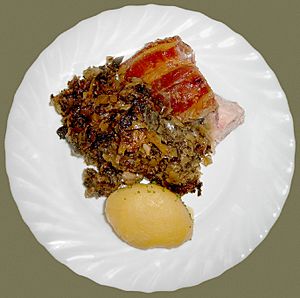Knieperkohl facts for kids

Knieperkohl served with kassler (cured pork) and pellkartoffel (potato cooked in its skin)
|
|
| Type | pickle |
|---|---|
| Place of origin | Germany |
| Region or state | Prignitz, Brandenburg |
| Associated national cuisine | German cuisine |
| Main ingredients | |
| Ingredients generally used |
|
| Similar dishes | |
Knieperkohl is a special kind of pickled vegetable dish from Germany. It's a bit like sauerkraut, which you might know. But Knieperkohl is unique because it uses more than just white cabbage. It also includes other leafy greens and even fruit leaves!
This tasty dish comes from a historical area in Germany called Prignitz, which is now part of the state of Brandenburg. It's a very important part of the food culture there.
What is Knieperkohl?
Knieperkohl is a dish made by pickling vegetables. Pickling is a way to preserve food, often using salt and a process called fermentation. This makes the food last longer and gives it a unique tangy flavor.
Special Ingredients
What makes Knieperkohl different from regular sauerkraut?
- It uses white cabbage, just like sauerkraut.
- But it also adds collard greens or leaves from red cabbage.
- And it includes kale, another healthy green leafy vegetable.
- To make it even more special, Knieperkohl also has grape leaves and cherry leaves mixed in. These leaves add to its unique flavor.
How to Enjoy Knieperkohl
Knieperkohl is usually served as a side dish. It goes really well with different kinds of meat.
Traditional Pairings
- One popular way to eat Knieperkohl is with cured pork. Cured pork is meat that has been preserved with salt, like ham.
- A common cured pork dish served with Knieperkohl is called Kassler.
- It's also often eaten with sausages. A special German sausage called Kohlwurst is a perfect match for Knieperkohl.
- And of course, potatoes are almost always served alongside. They are a classic German side dish.
 | William M. Jackson |
 | Juan E. Gilbert |
 | Neil deGrasse Tyson |

